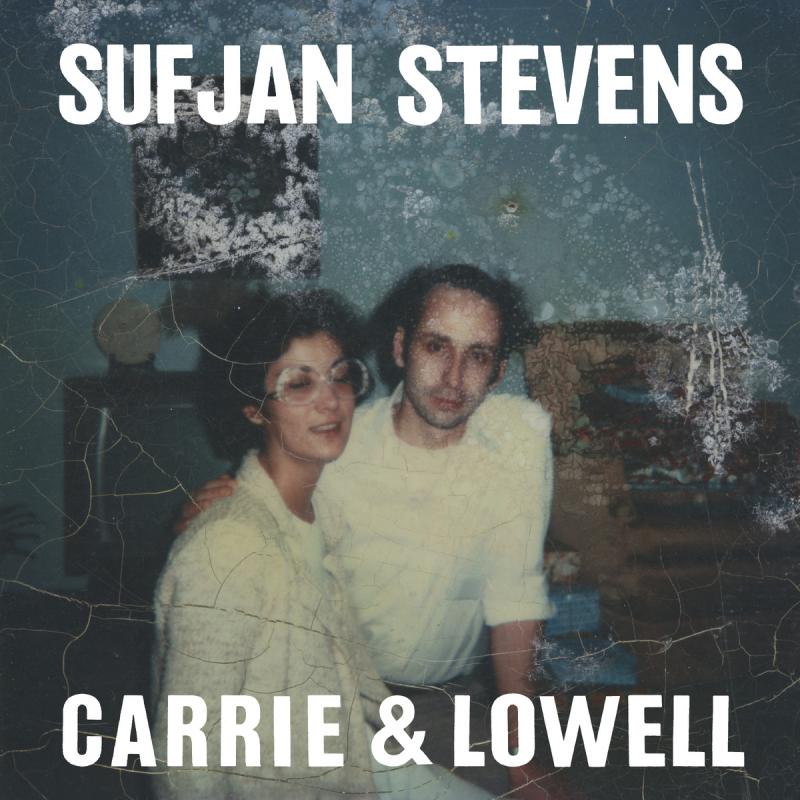CD: Sufjan Stevens - Carrie & Lowell | reviews, news & interviews
CD: Sufjan Stevens - Carrie & Lowell
CD: Sufjan Stevens - Carrie & Lowell
Experimental songwriter returns to his roots on gut-wrenching new album

Let’s get one thing straight: Sufjan Stevens’ Carrie & Lowell is not a folk album. Folk, in this case, is a word used as a comfort blanket in an attempt to summarise the Michigan songwriter’s return to simple, acoustic music after the apocalyptic electronica of 2010’s The Age of Adz or the epic, high-concept Illinois. But folk music is a communal thing, predicated on culture and oral tradition.
For an album so personal and yet so oblique, it makes sense that the songs come in waves: fragments of poetry breaking through ambient waves like radio static, half-whispered vocal delivery and the lightest of touches on pedal steel and acoustic guitar. That the album is Stevens’ reckoning with his mother’s death from stomach cancer in 2012 is no secret – she’s the titular Carrie, while Lowell is Stevens’ stepfather – but the lyrics are less straightforwardly autobiographical than vignettes as tattered as the portrait of the pair that forms the album’s cover art. They’re part stream of consciousness, part diary entries written for nobody else’s eyes and so presented without need for context or elaboration: “when I was three, maybe four, she left us at that video store”; “lemon yoghurt, remember I pulled at your shirt, I dropped the ashtray on the floor, I just wanted to be near you”.
Still incredibly affecting even at their most abstract, these songs combine the cries of the small boy abandoned by his alcoholic, schizophrenic mother and the regrets of the man who will never get to know her better. Where the lyrics become more direct – with a death on the quietly devastating “Fourth of July”, or self-destruction and sorrow on gorgeous album stand-out “The Only Thing” – the album is completely immersive. But even when meaning is buried in abstraction and metaphor this is an album that demands close listening and a good pair of headphones.
Overleaf: hear "No Shade in the Shadow of the Cross"
rating
Explore topics
Share this article
The future of Arts Journalism
You can stop theartsdesk.com closing!
We urgently need financing to survive. Our fundraising drive has thus far raised £49,000 but we need to reach £100,000 or we will be forced to close. Please contribute here: https://gofund.me/c3f6033d
And if you can forward this information to anyone who might assist, we’d be grateful.

Subscribe to theartsdesk.com
Thank you for continuing to read our work on theartsdesk.com. For unlimited access to every article in its entirety, including our archive of more than 15,000 pieces, we're asking for £5 per month or £40 per year. We feel it's a very good deal, and hope you do too.
To take a subscription now simply click here.
And if you're looking for that extra gift for a friend or family member, why not treat them to a theartsdesk.com gift subscription?
more New music
 The Last Dinner Party's 'From the Pyre' is as enjoyable as it is over-the-top
Musically sophisticated five-piece ramp up the excesses but remain contagiously pop
The Last Dinner Party's 'From the Pyre' is as enjoyable as it is over-the-top
Musically sophisticated five-piece ramp up the excesses but remain contagiously pop
 Moroccan Gnawa comes to Manhattan with 'Saha Gnawa'
Trance and tradition meet Afrofuturism in Manhattan
Moroccan Gnawa comes to Manhattan with 'Saha Gnawa'
Trance and tradition meet Afrofuturism in Manhattan
 Soulwax’s 'All Systems Are Lying' lays down some tasty yet gritty electro-pop
Belgian dancefloor veterans return to the fray with a dark, pop-orientated sound
Soulwax’s 'All Systems Are Lying' lays down some tasty yet gritty electro-pop
Belgian dancefloor veterans return to the fray with a dark, pop-orientated sound
 Music Reissues Weekly: Marc and the Mambas - Three Black Nights Of Little Black Bites
When Marc Almond took time out from Soft Cell
Music Reissues Weekly: Marc and the Mambas - Three Black Nights Of Little Black Bites
When Marc Almond took time out from Soft Cell
 Album: Mobb Deep - Infinite
A solid tribute to a legendary history
Album: Mobb Deep - Infinite
A solid tribute to a legendary history
 Album: Boz Scaggs - Detour
Smooth and soulful standards from an old pro
Album: Boz Scaggs - Detour
Smooth and soulful standards from an old pro
 Emily A. Sprague realises a Japanese dream on 'Cloud Time'
A set of live improvisations that drift in and out of real beauty
Emily A. Sprague realises a Japanese dream on 'Cloud Time'
A set of live improvisations that drift in and out of real beauty
 Trio Da Kali, Milton Court review - Mali masters make the ancient new
Three supreme musicians from Bamako in transcendent mood
Trio Da Kali, Milton Court review - Mali masters make the ancient new
Three supreme musicians from Bamako in transcendent mood
 Hollie Cook's 'Shy Girl' isn't heavyweight but has a summery reggae lilt
Tropical-tinted downtempo pop that's likeable if uneventful
Hollie Cook's 'Shy Girl' isn't heavyweight but has a summery reggae lilt
Tropical-tinted downtempo pop that's likeable if uneventful
 Pop Will Eat Itself's 'Delete Everything' is noisy but patchy
Despite unlovely production, the Eighties/Nineties unit retain rowdy ebullience
Pop Will Eat Itself's 'Delete Everything' is noisy but patchy
Despite unlovely production, the Eighties/Nineties unit retain rowdy ebullience
 Music Reissues Weekly: The Earlies - These Were The Earlies
Lancashire and Texas unite to fashion a 2004 landmark of modern psychedelia
Music Reissues Weekly: The Earlies - These Were The Earlies
Lancashire and Texas unite to fashion a 2004 landmark of modern psychedelia

Add comment